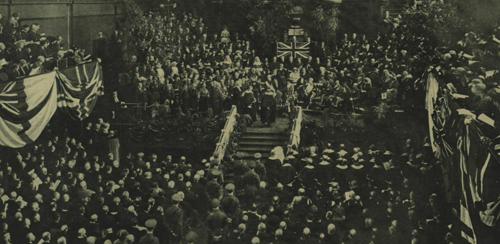Belfast’s big welcome for first Governor General of Northern Ireland
As Parliament is re-opened, plans are outlined for all civil servants in north to take oath of allegiance
Belfast, 28 February 1923 - Northern Ireland has been bustling with activity over the last few days due to the recent political ceremonies that have taken place there.
Following an impressive demonstration of loyalism in Belfast on the 26th to mark the state entry into the city of the first Governor General of Northern Ireland, James Albert Edward Hamilton, 3rd Duke of Abercorn. Yesterday saw the state opening of the Northern Ireland Parliament.
In a telegram to King George V, the Governor General noted that he received the ‘most enthusiastic and loyal welcome’ in the city. The monarch, in response, recalled the reception that both he and the Queen received in the same city in the summer of 1921 when attending the formal opening of the new Parliament.
Although inclement weather disrupted plans for an open-air ceremony at the city boundary, a presentation by the Lord Mayor of Belfast of a gold key - a symbol of the city’s loyalty- to Lord Abercorn, took place instead at Stormont Castle.

The Lord Mayor of Belfast Alderman W.G Turner handing the gold key of the city to the Duke of Abercorn (Image: Illustrated London News, 3 March 1923)
Subsequently, the Duke and Duchess of Abercorn were taken in a procession of vehicles to the Ulster Hall. Along the route to the hall, the streets were adorned with union jacks and thousands of people congregated. On arrival, the Governor General was met with a salute of 19 guns -fired from the guns of the 4th Howitzer from the grounds of the Royal Belfast Academical Institution - and a presentation of 115 addresses from public bodies, churches and various other organisations.
In reply, the Governor General expressed his deep gratitude for the welcome he had received and for the addresses that had been given. ‘I find it well that representatives of the vigorous and many-sided life of Northern Ireland should thus turn aside upon occasion from their several interests to commemorate their common loyalty in union. Such a meeting reminds us - certainly it has reminded me - how complex and how delicately poised is the life of a great community, what demands its preservation and advancement make on the faith and labours and tolerance of us all...I am honoured today by the hospitality of Belfast.’
He continued:
‘We live in times of difficulty, not merely in Ireland, but in Europe and far beyond. In such times there is one clear signal which every man may confidently obey - the signal to devote himself to his duty and to the task that is ready to his hand. I take your presence here this morning for proof that Northern Ireland has read that signal and is devoting herself to its fulfillment with all her age-long capacity and determination.... ’
After the Duke of Abercorn finished reading his reply, the Ulster Hall was filled with the sound of trumpets and a procession was reformed and passed down the centre of the hall as the British national anthem played.
The following day, it fell to the Governor General to read the King’s speech at the opening of the Northern Ireland Parliament. The legislation promised by the British government would cover issues of education, industry and temperance reform. However, the schedule for the new Parliamentary term also provides for a bill making it obligatory upon all civil servants and other persons employed by the Belfast government to take an oath of allegiance to the King and the Government. This is a measure that is certain to create difficulties for the members of the Nationalist community in Northern Ireland.
In relation to finance, the King’s speech notes the establishment by the British government of a special committee under Lord Colwyn to inquire into the financial relationship between the British government and that of Northern Ireland.
Replying to the speech, the Prime Minister of Northern Ireland, Sir James Craig, remarked upon the great generosity of the British government in guaranteeing the payment of Ulster Special Constables for the year. Mr. Craig believed the administration should congratulate itself on restoring law and order to Northern Ireland. He added that an arrangement was now in place to secure the safety of the border and that the Belfast government could, at a moment’s notice, get what was necessary to take action if required.
British Pathé newsreel footage of a parade to celebrate the appointment of the Duke of Abercorn as the First Governor of Northern Ireland in Belfast
[Editor's note: This is an article from Century Ireland, a fortnightly online newspaper, written from the perspective of a journalist 100 years ago, based on news reports of the time.]





















